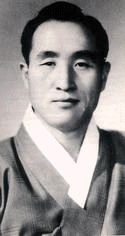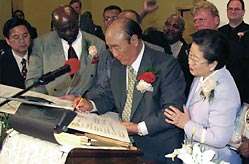Goto “Deprogramming” Case Reveals Japan’s Religious Freedom Violations
Mr. Goto is suing “deprogrammers,” Takashi Miyamura and Yasutomo Matsunaga, for false imprisonment. International Religious Freedom Report
 Goto “Deprogramming” Case Tests Japan’s Commitment to Religious Freedom
Goto “Deprogramming” Case Tests Japan’s Commitment to Religious Freedom
by Elizabeth Brennon on Oct 12, 2011
The International Coalition for Religious Freedom today released the translated Tokyo court statement of Toru Goto, the Japanese man whose relatives allegedly held him against his will for 12 years in an attempt to break his faith in the Unification Church.
Mr. Goto is suing several family members and two “deprogrammers,” Takashi Miyamura and Yasutomo Matsunaga, for false imprisonment. His case is viewed by human rights activists as a test of Japan’s commitment to freedom of religion and belief. The U.S. State Department cited the case in its current International Religious Freedom Report:
Japan Religious Freedom Report
“It was September 11, 1995 at my parents’ home in Tokyo when I was suddenly surrounded and pushed into a van, which drove me to an apartment arranged for the confinement,” Mr. Goto stated. He was 31 years old at the time.
| Luck of Religious Freedom in Japan | |
| Buddhist priest: Stop Forced Conversion of Unificationists | |
| France's arguments for banning the veil |
He says he spent the next 12 years and five months in several apartment-prisons in the Tokyo area. Prevented even from going outdoors for a walk, when he finally gained his freedom his muscles had atrophied, and he had to be hospitalized for three weeks for severe malnutrition.
“So-called ‘deprogramming’ is a kind of spiritual rape involving kidnapping, false imprisonment, and a fundamental abuse of the human right to religious freedom,” Mr. Goto told the annual conference of the Center for Studies on New Religions in Taipei.
“I was forced to receive daily doses of abusive language against the church and its founder, Rev. Sun Myung Moon. Anytime I refuted them, they called me ‘Idiot! Stupid! Evil!’ and so on. My mental pain was beyond description and I felt like dying.”
“I frequently attempted escape, even attempting to force my way out, but each time I was overpowered by physical violence,” he said. “After more than 12 years had passed in detention, all of a sudden my family cruelly threw me out of the apartment in the middle of winter with no money and nothing but the clothes on my back. I was already 44 years old.”
Police, apparently thinking he was deranged, reportedly refused to help him as he tried to make his way to Unification Church headquarters several miles away. So weak that he was forced to crawl at several points, Mr. Goto says he eventually begged for help from a woman who turned out to be a church member and gave him cab fare. Church members immediately took him to the hospital where he was diagnosed with malnutrition and several muscle weakness due to his apparent long confinement.
He filed criminal charges against those involved in his confinement, but prosecutors refused to indict the alleged perpetrators for “lack of evidence.” The defendants in his current civil suit include several relatives, a professional faith-breaker named Takashi Miyamura and Christian minister Yasutomo Matsunaga. Both are known to have been involved in several previous cases of alleged “faith-breaking.”
Lawyers for the defendants claim that Mr. Goto’s alleged confinement was entirely voluntary. During an inquest for the earlier criminal case, they argued that internal locks on apartment windows and doors were placed there to keep the Unification Church from taking Mr. Goto away, rather than to keep him from escaping.
Over the past 40 years, thousands of the Unification Church members, Jehovah’s Witnesses and other minority groups have reportedly been subjected to similar criminal practices, with confinements lasting from several days to more than two years. Although such practices were ruled illegal in the U.S. and Europe, as yet no criminal indictments have resulted in Japan. Civil suits have sometimes been dismissed as mere “family matters,” even when forced confinement is recognized as a fact.
The Unification Church estimates that in the past decade about 10-20 of its Japanese members have been abducted each year to undergo forced de-conversions. About half return to the church, often after first pretending to renounce their faith in order to convince their captors to set them free.
Last month, Mr. “K.M.” was apparently kidnapped and has been missing from both the church and his workplace since September 5. His Hungarian fiancé has contacted ICRF to ask for help in locating him.
Mr. Goto’s court statement can be accessed at the following link:
Toru Goto’s Statement to the Tokyo District Court
About International Coalition for Religious Freedom:
The International Coalition for Religious Freedom is a non-profit, non-sectarian, educational organization dedicated to defending the religious freedom of all, regardless of creed, gender or ethnic origin. ICRF acknowledges with gratitude that, at the current time, it receives the bulk of its funding from institutions and individuals related to the Unification Church community. Contributions to ICRF are tax-exempt under section 501-c-3 of the Internal Revenue Code of the USA.
International Coalition for Religious Freedom
 | Human Rights violations in Japan, violation of United Nations human rights agreements Investigate Violations in Japan Religious Scholars Urge to Investigate Human Rights Violations in Japan... |
Mr. Goto is suing “deprogrammers,” Takashi Miyamura and Yasutomo Matsunaga, for false imprisonment. International Religious Freedom Report:



























